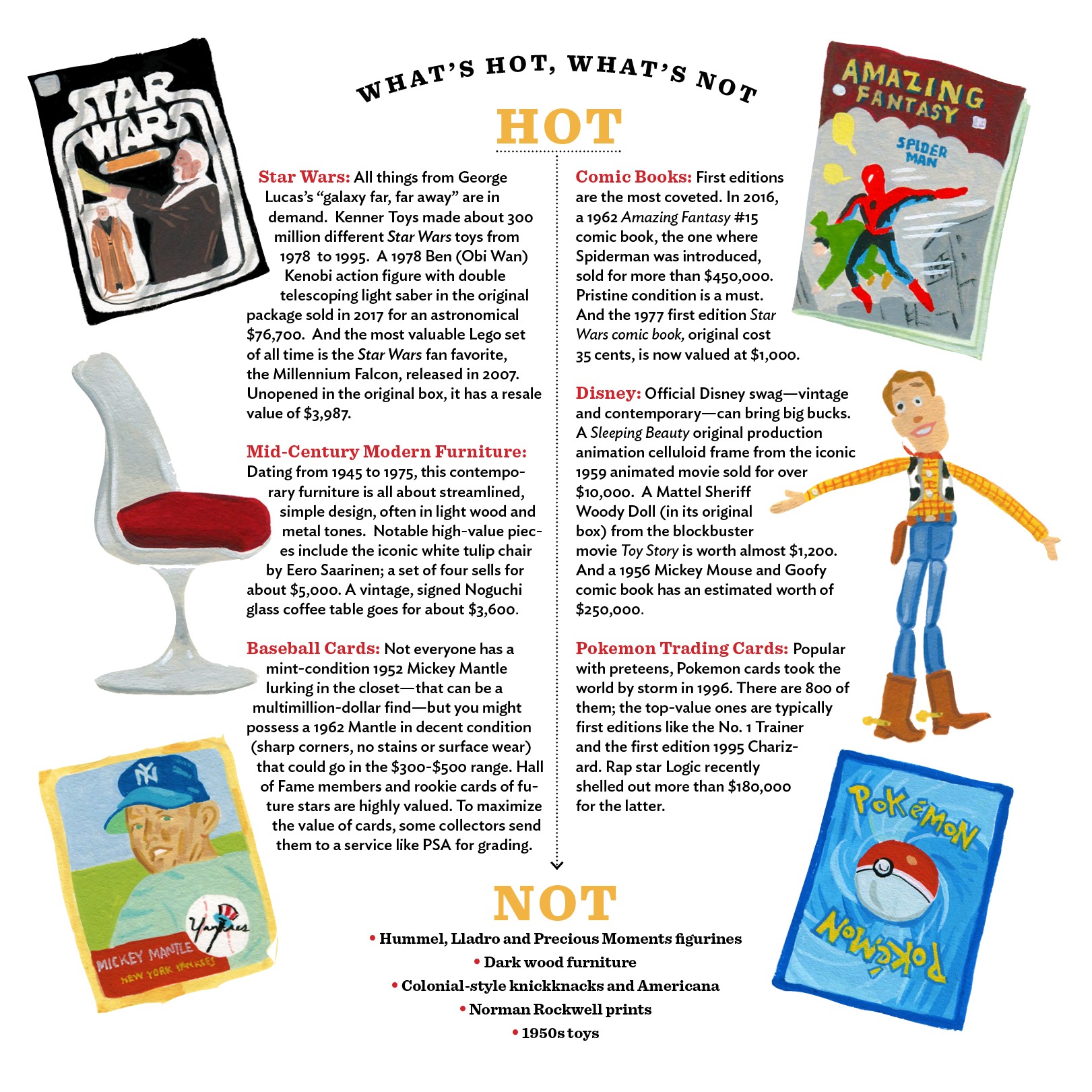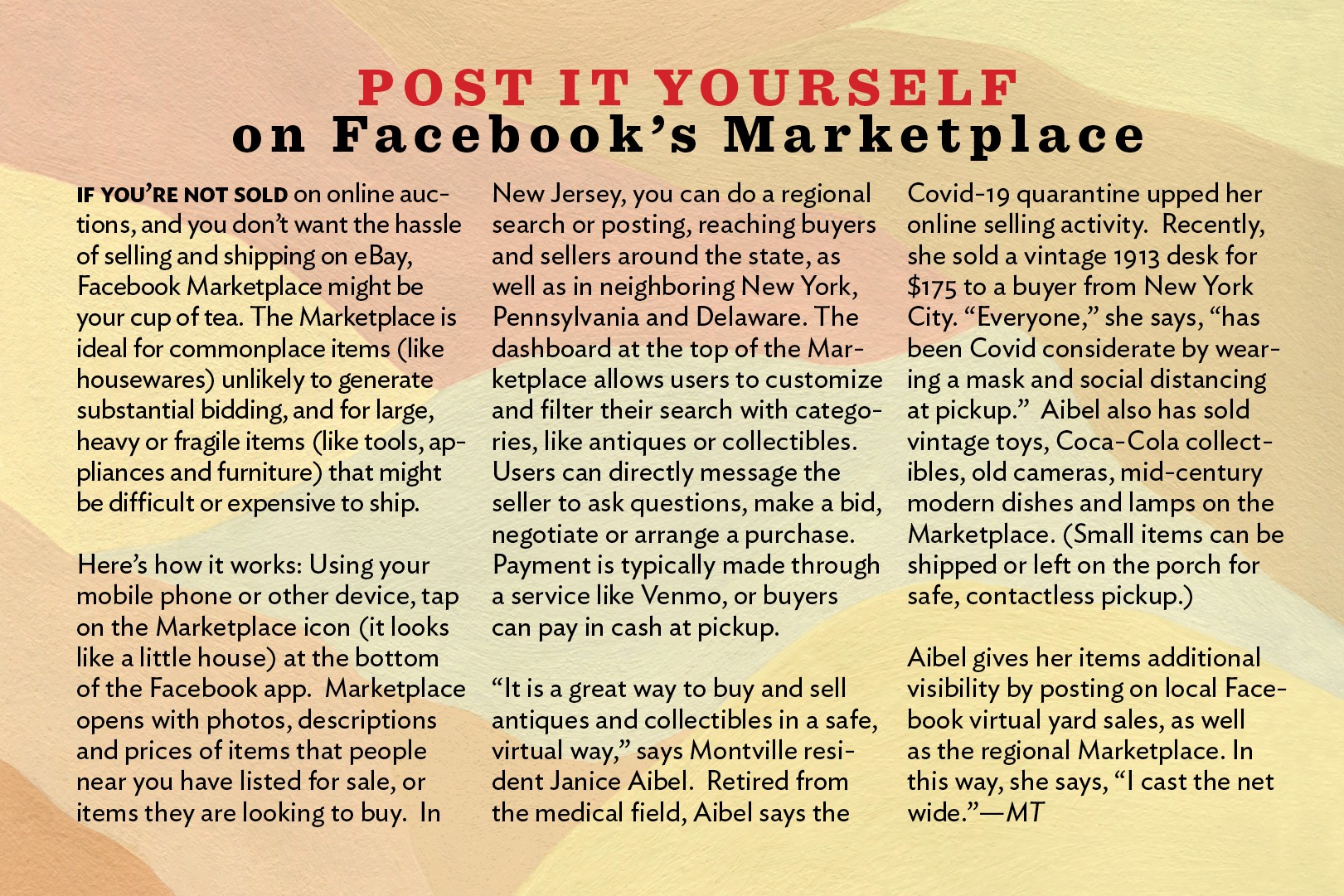
Illustration by Juliette Borda
It was a colorful ballet scene set in some long-ago theater. The large oil painting had hung for years on an office wall. “We knew it was Russian,” says Mary Jones (not her real name), who inherited the painting from her father.
“We are not art collectors and had no interest in keeping it,” says Jones. Last June, quarantined at home in Eatontown and eager to clean house, Jones set out to sell what was discovered to be a signed Konstantin Somov, dated 1923.
For the sale, Jones chose Millea Bros., a small, boutique auction house in Boonton with a Covid-19-safe online auction platform. The painting sold for a whopping $425,000. The price exceeded Jones’s expectations—as well as the auctioneers’. Jones was able to watch as the bidding soared. “It was our first time with an online auction,” says Jones. “It was very exciting.”
While you may not have a rare or desirable oil painting hanging on your wall, you may well be sitting on other treasures—from childhood collectibles to unwanted family heirlooms—that can be turned into cash.
[RELATED: How We Decluttered Our Home of 30 Years]
Typically, brick-and-mortar auction houses have been the places to go for maximum value for such items, but with the pandemic, most such establishments have shelved their in-person events, turning instead to online auctions. And with so many people cleaning house, the Garden State’s online-auction businesses are booming.
“Our members have had to become creative and offer virtual, online bidding during the pandemic,” says Harry Byrnes, president of the New Jersey State Society of Auctioneers (NJSSA). Many New Jersey auction houses use liveauctioneers.com, a New York–based platform, for streaming sales online. The results have been impressive. “New Jersey–based auction houses held 52 percent more auctions and sold 64 percent more items in 2020 vs. 2019,” says CEO Phil Michaelson of liveauctioneers.com.
Online auctions have “performed exceptionally during the pandemic,” says Mark Millea, who, with his brother Michael, started Millea Bros. in 2003. Their focus is on the art and antiques markets; most of their inventory comes from New Jersey/New York metro-area estates.
What’s selling right now? Chinese decorative arts (in porcelain and jade), antiquities, African and Native American arts, clocks and “luxury-brand watches by Patek Phillippe and Rolex,” says Millea. Classic and contemporary signed art—like the Konstantin Somov painting—is also strong.

Illustrations by Juliette Borda
Of course, not everything gets top dollar at auction. “To be a successful seller, you need to understand what buyers want,” says Harry L. Rinker, antiques collector, appraiser and nationally syndicated columnist of Rinker on Collectibles. “Just because something is old,” says Rinker, “does not make it valuable.” Rather, he says, supply and demand dictate the market.
And demand changes with the times. For example, Rinker points out that “today’s buyers were kids growing up in the 1970s through 1990s. Think about what television shows and movies they watched and what toys they played with.”
Indeed, Joe Bodnar of Bodnar Auctions in South Brunswick says, “I am selling a lot of retro tech.” That means items like vintage cell phones (think Grandma’s trusty flip phone) and old-school video gaming systems like Atari and Game Boy. As with everything, condition is key. New, in-the-original-box items always rake in more cash.
Bodnar has been auctioning for more than 28 years. His popular in-person auctions are typically held at the New Jersey Convention and Expo Center. Currently, via online sales only, his auction house is selling about 300 items a day, down from 3,000 items a day pre-pandemic. Still, he says, profitability is up.
Bodnar says smaller nostalgia items like Marvel comic books, Barbie dolls and Pokemon trading cards are selling like hotcakes. “If it is shippable, it’s sellable,” he says, but adds, “Twenty years ago, china and silver were the top sellers—not anymore.”

Marlboro resident Charles Napolitano, an avid collector of antique mantel and bookshelf clocks, turned to Bodnar when he decided to part with about 20 of his beloved vintage timepieces. The clocks dated from the 1800s to the 1940s. At auction with Bodnar, they netted him $1,000.
 “I was always a Bodnar auction buyer and used to enjoy attending the monthly live auctions,” says Napolitano. “While online is not as good as in person, they make it very engaging, fast-paced and accurate regarding the item descriptions.” He advises potential buyers and sellers to attend some online auctions before getting involved. Buyers and sellers should also research the auction houses before jumping into the fray.
“I was always a Bodnar auction buyer and used to enjoy attending the monthly live auctions,” says Napolitano. “While online is not as good as in person, they make it very engaging, fast-paced and accurate regarding the item descriptions.” He advises potential buyers and sellers to attend some online auctions before getting involved. Buyers and sellers should also research the auction houses before jumping into the fray.
“New Jersey does not require auction houses to be licensed, so be sure to check the online reviews of any auction house,” says the NJSSA’s Byrnes. NJSSA members are sworn to abide by a higher code of ethics. Currently, approximately 50 of the 90 auction houses in New Jersey are NJSSA members.
[RELATED: 10 Jersey Towns with Soaring Home Sales]
Most, if not all, New Jersey auction houses have state-mandated Covid-19 safety protocols in place, so you can safely bring your collectibles in to be appraised and cataloged for an online auction. “Pre-pandemic, we would open our auction gallery to live preview and bidding in person,” says Michael Millea. “Now everything is online. Client visits are done by appointment only, with masks and social distancing.”
Buyers and sellers should also research the commissions and buyer’s premiums that all auction houses charge. “No commissions or buyer’s premiums are set in stone,” says Byrne. “It is up to the auctioneer to determine the percentage.” Commissions, says Byrnes, are typically in the range of 15–30 percent for art and antique estate auction houses. Most commissions and buyer’s premiums are collected after the item has sold. Sellers may also be responsible for shipping costs.
***
Selling online is nothing new for John Nye of Nye & Co. in Bloomfield. “We have been conducting virtual online auctions worldwide for over 15 years,” says Nye. Formerly with Sotheby’s, Nye focuses on high-end items. Current hot sellers include sterling silver (Gorham and Jensen), oil paintings, luxury jewelry (Tiffany, Patek Phillipe, Rolex) and Asian art.
In September, Sue Smith (not her real name) of Frenchtown looked to Nye & Company to sell the entire contents of her mother’s home, including many decorative items. A standout bronze sculpture by American artist Harriet Whitney Frishmuth sold for $61,500. “I researched online, read about John’s background and spoke with him. He made it simple for me,” says Smith, a first-time online-auction seller.
Online auctions are likely to remain strong as long as the pandemic requires social distancing. The good news is that they expose inventory to a larger pool of bidders, says Byrnes. On the downside, he notes, “online bidders have a much higher default rate, take much longer to pay and pick up.”
What’s more, online auctions take away the face-to-face human interaction at the heart of a live auction. You can’t really experience the gavel-pounding energy of an auction room while logged in from your kitchen. The auctioneers feel it too.
“I really miss a live audience,” says Mark Millea. “Nothing beats the excitement and energy of selling to a crowded auction room.”
Michele Treacy is a Kinnelon-based freelance writer. She’s eager to participate in her first online auction.



